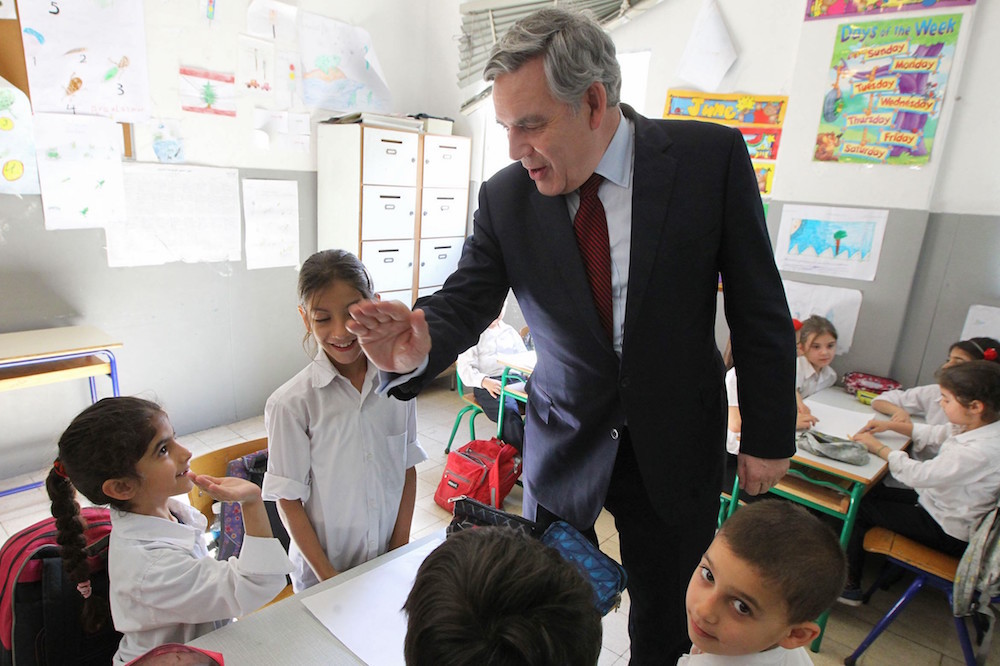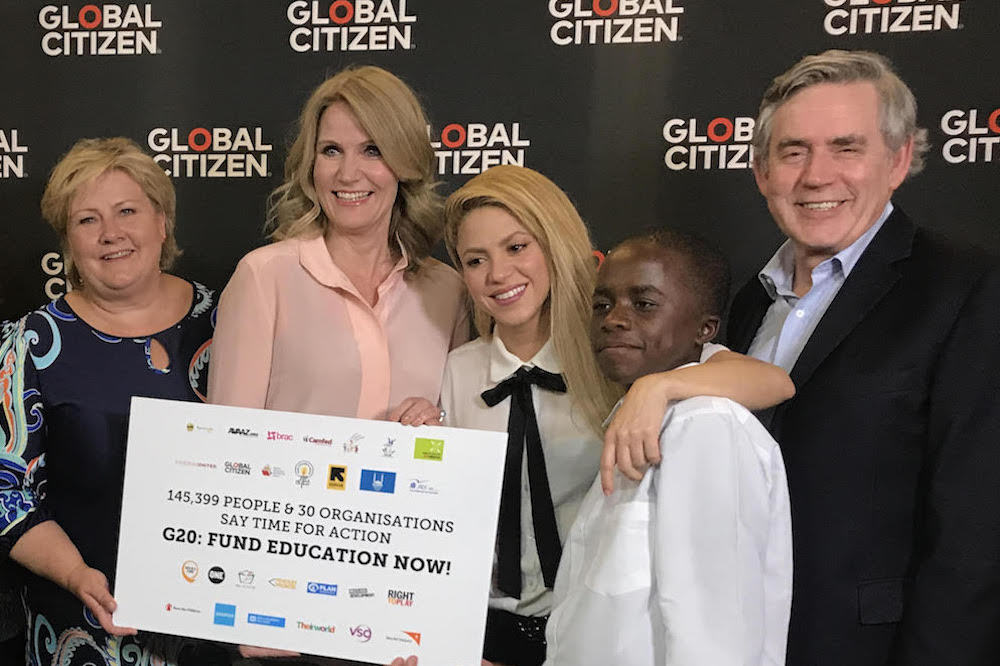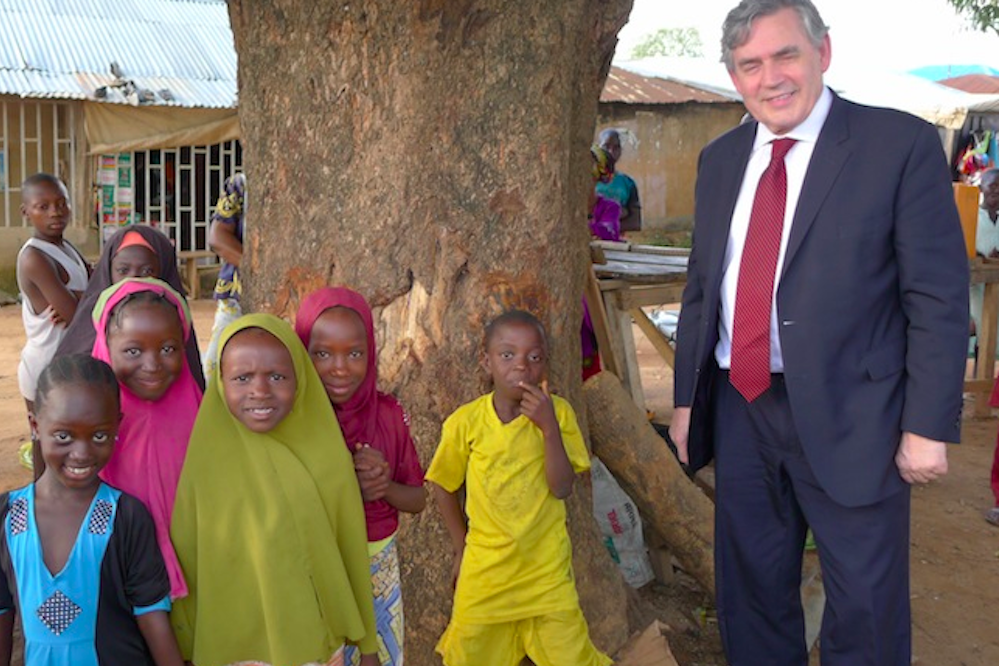“Fulfilling the promise of quality education for all is the civil rights struggle of our time”

In his new memoirs, former UK Prime Minister Gordon Brown talks about his role as a UN envoy and how 2018 could be a turning point for global education.
Gordon Brown was British Prime Minister from 2007 to 2010, after 10 years as Chancellor of the Exchequer. Since 2012, he has been the United Nations Special Envoy for Global Education.
His memoirs – My Life, Our Times – have been published this week by the Bodley Head, Penguin Random House. As well as his remarkable life in politics, Brown talks about his work to further children’s rights and bring education to the global agenda.
He says: “The mission I felt – and feel – most strongly about is championing the cause of children, not just in Britain but also in the most difficult and most desolate places in the world. Since my schooldays, I had dreamed of what I could contribute in any way, however small, to creating a world free of poverty.”
The following is an extract from the book, in which Brown describes his UN role, the campaign to get every child in the world into school and how 2018 could be a turning point for global education.

Gordon Brown with a message for G20 leaders at the Global Citizen Festival in July with Norwegian Prime Minister Erna Solberg; Helle Thorning-Schmidt, CEO of Save the Children International; singer and Education Commissioner Shakira; Malawian schoolboy Wongani Nyirenda
For too long, global education has been neglected. Its share of aid has fallen from 13% in 2000 to 10% today, with the result that half of the world’s children – 800 million – are forced out of education before their time, mainly through poverty, and lack even the basic skills necessary for the jobs of the future, a figure which will worsen by 2030 if we do not act now.
In the 1960s, a civil rights struggle starting in America swept the world. In the 1970s and 80s, people came together to boycott a South African regime and end the oppressive forces of apartheid.
And in the last two decades, guarantees for the rights of women, people with disabilities and LGBT persons have started to emerge. But the cause of children’s rights is too often unrecognised, unfulfilled and met with indifference.
Even when armed with the knowledge that the best antidote to the great evils of child marriage, child labour and child trafficking is an education, we still fail to deliver on that most fundamental promise of a quality and inclusive education for all – and not just some – children.
That is why I believe fulfilling this promise – particularly with respect to girls’ education – is the civil rights struggle of our time.
It is, of course, education that also unlocks our other great development goals.
I see Britain’s commitment to universal education – guaranteeing schooling to the poorest and most vulnerable children in the least promising corners of the world – as the British people demonstrating our internationalism in practice and cajoling other nations to do likewise.
I want our internationalism to be akin to a bright beacon on a mountaintop, radiating enough energy to enlist the generosity of others and give hope to desolate and despairing children everywhere.
Of course in practice our internationalism will often seem no more than a small flame flickering dimly amidst the strong countervailing winds of nationalism and narrow self-interest.
But as long as millions of parents believe investment in education is a path out of poverty, and desire for all children what they seek for their own, then that same can never be extinguished.
And it is, of course, education that also unlocks our other great development goals: gender equality, improved girls’ health, better employment prospects, a higher quality of life, and a more enlightened attitude to coexistence between the religions of the world.
In 2011, I authored a report with Kevin Watkins, now head of Save the Children UK, showing that education aid was less than $10 per child per year – barely enough to buy one second-hand school textbook.
While global health, I argued, had a regiment of patrons across the world – from governments in Norway and the US to institutions like the Gates Foundation and the Global Fund – there was, at that time, no government championing global education (though Norway soon came on board) and no philanthropic equivalent to Bill Gates.
That year, Ban Ki-moon, whom I knew from before he became UN Secretary-General, asked me to serve as the UN Special Envoy for Global Education. It is a role I have continued to hold under the new Secretary-General, another friend, António Guterres.
To fulfil my duties as special envoy I employed a small team, led by the highly-qualified education expert and tireless campaigner Dr Justin van Fleet, and funded by the proceeds of any speeches and writing work I did, all of which were donated to this and other public service and charity work.
In this role, I have since travelled to meet children in countries where millions are not at school – Pakistan, India, East Timor, South Sudan, Uganda, Nigeria, Ethiopia, Tanzania, South Africa – and in countries with large refugee populations from the conflicts in Iraq and Syria – Jordan, Lebanon and Turkey.
I was privileged to chair the Education Commission, which produced an ambitious yet credible road map to make ours the first generation in history where every child is in school and learning.
I took up the cases of the Chibok girls who had been kidnapped from their school in Nigeria, of girls fighting child marriage, and of Malala Yousafzai and her two friends, Shazia and Kainat, who had been shot by the Taliban in October 2012 simply because they were girls daring to go to school.
I visited Malala in hospital a few days after her shooting, ran an event to mark her 16th birthday at which she addressed the UN, and Sarah and I were among those who helped Shazia and Kainat through their schooling in Britain.
As UN special envoy I also helped raise money to offer 250,000 children in Lebanon education in “double-shift schools”, where the same classrooms in which local children are taught in the morning are used to teach refugees from bordering Syria in the afternoon, and fought for a new fund – Education Cannot Wait – to pay for education for the world’s 30 million displaced children.
Thanks to the Norwegian government, in 2015 the International Commission on Financing Global Education Opportunity brought together a groundbreaking team – composed of presidents and prime ministers to Nobel Laureates, NGO leaders and young people – to plan the future of global education.

Visiting a school in Nigeria, where the Safe Schools Initiative was established (Theirworld)
I was privileged to chair the commission, which produced an ambitious yet credible road map to make ours the first generation in history where every child is in school and learning.
After demonstrating that no ordinary initiative could ever fill the $90 billion a year aid funding gap, we proposed an International Finance Facility for Education – underpinned by guarantees from donor nations – that will raise $10 billion a year for developing countries, virtually doubling annual education aid.
With the help of Shakira – a global superstar and champion of girls’ education whom I first met in London in 2005 – the proposed Finance Facility was endorsed by the 2017 G20 in Hamburg.
Today, there are still 260 million boys and girls who will never receive any schooling and another 400 million who will exit schooling far too early at the age of 10 or 11 and, in turn, miss out on a secondary education.
By putting education on the agenda and agreeing to marshal the vital funds necessary to launch the International Finance Facility for Education, the G20 of 2018, to be hosted by Argentina, can mark a turning point for global education in the same way that the G8 of 2005 turned the corner on debt relief.
- All Gordon Brown’s proceeds from this book will go to the Jennifer Brown Research Laboratory and Theirworld.